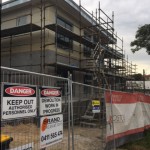DATA NEWS We love data!
Data points to slowdown
A fair amount of economic data this week and none of it was very encouraging.
The main one was the Reserve Bank’s decision to cut interest rates 0.25 percent to a record low of 1.5 percent.
The RBA acknowledged it wasn’t worried about re-inflating the property bubble (more on that later) so was obviously worried about the sluggish performance of the economy going forward which have shown up in the employment and inflation numbers.
BANK BLOWBACK
Of course when the four big banks failed to pass on the full extent of the cut to home loan borrowers the Federal Government hit the roof and demanded explanations. But really the horse bolted years ago with no real competition out there to make sure pricing is exercised at the highest level.
Secondly the banks are now conscious that a large part of their customer base is older depositors who are growing more concerned about fix interest returns and are frantically looking around for better yielding investments.
So if the banks pass on the full cuts to home loan borrowers then they have to lower fix interest returns for a large majority of their depositors. That puts their earnings and subsequently their dividends under pressure. And who makes up the banks’ largest number of individual shareholders? That’s right those older/retiree depositors.
Who would want to be a banker in this market?
So what else is there to worry about?
OVERALL SPENDING IS WEAK
Well for a start no one seems to be spending. Retail sales rose 0.1 per cent in June after a 0.2 per cent lift in May. CommSec points out that real (inflation-adjusted) terms, retail trade rose by 0.4 per cent in the June quarter which up 1.9 per cent on a year ago – but the slowest annual growth in three years.
HOME BUILDING SLOWS
House building fell back in July from June’s 30-month high and apartment building contracted, according to the latest performance of construction index.
 The house-building sub-index dropped 7.2 points to 54.9, while apartment building activity also fell 7.2 points to 48. There’s no getting around the fact that construction is slowing, the question is by how much? Dwelling approvals have also been reflecting this, falling by 2.9 per cent in June after falling by 5.4 per cent in May.
The house-building sub-index dropped 7.2 points to 54.9, while apartment building activity also fell 7.2 points to 48. There’s no getting around the fact that construction is slowing, the question is by how much? Dwelling approvals have also been reflecting this, falling by 2.9 per cent in June after falling by 5.4 per cent in May.
CAR SALES STALL
Despite being well on the way to a record year for cars sales in Australia, the month of July was not a happy one for the motor trade despite a myriad of end-of-financial-year sales promotions.
According to Federal Chamber of Automotive Industries 91,331 new vehicles were sold last month, which is down 1.1 per cent over July last year. Annual sales sit at 689,471, up 2.8 per cent over last year’s record.
The good news was that business fleets grew 12 per cent to 38,222 last month, but private sales fell 13 per cent to 41,594.
CONCLUSION
Most of these slowdowns have been put down to the drawn-out and slightly inconclusive federal election. Let’s hope that confidence is restored quickly otherwise the RBA might have to give the economy another boost. At the end of the week the RBA was maintaining its economic targets at 2.5-3.5 per cent growth over the coming year with underlying inflation in the 1.5-2.5 per cent range over the next year, below the 2-3 per cent target band.

